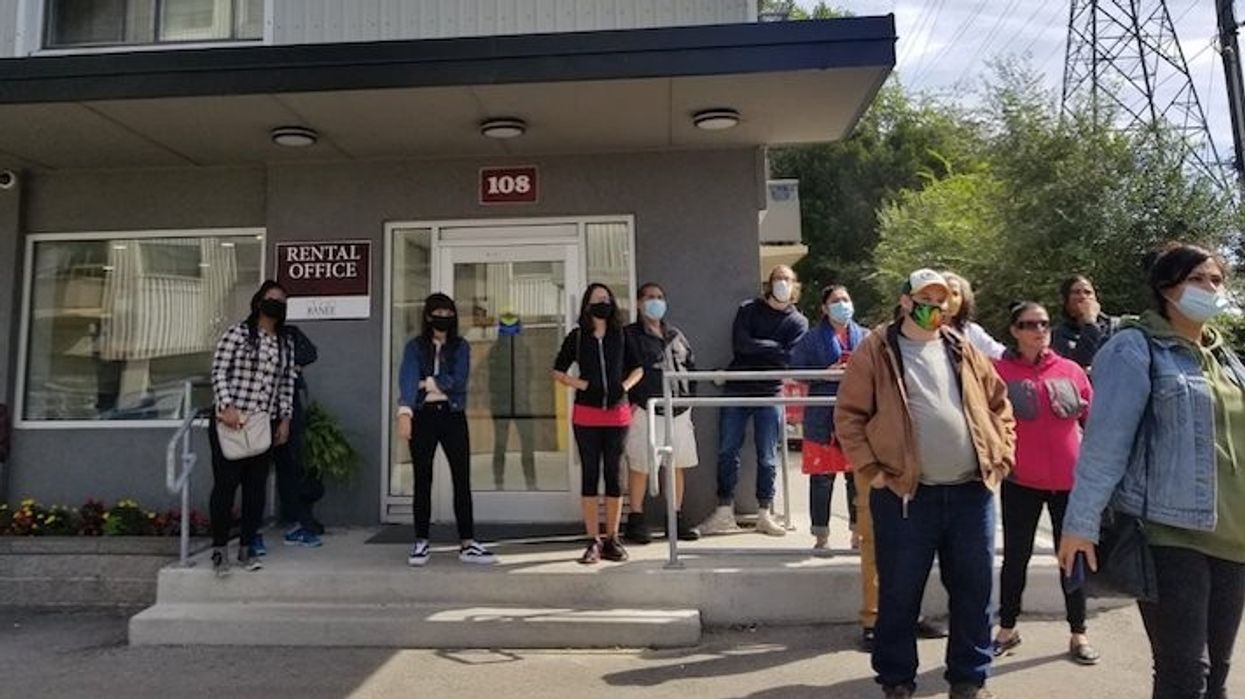Tensions were high on Monday afternoon after dozens of Toronto tenants and supporters gathered outside of an apartment building in East York, successfully preventing sheriffs from evicting a resident.
Since September 14, members of the Goodwood Tenants Union (GTU) have been taking turns patrolling outside the apartment complex at 108 Goodwood Avenue in the case the sheriff shows up to change the locks on a tenant's unit.
On Monday, September 21, the sheriff did arrive at the building; however, dozens of tenants and supporters were on the scene and successfully prevented the individual from entering. As a result of the protest, several police officers also arrived on scene.
In total, according to Keep Your Rent Toronto -- an organization focused on preventing COVID evictions -- 14 police officers came to Goodwood Park to try to enforce the eviction.
After being unable to successfully access the building, the police officers left the apartment complex.
"Tenants and supporters successfully stopped evictions in Goodwood Park today; preventing an indigenous sister with mental and physical health concerns from being thrown in the street," wrote People's Defence, an organization of poor and working people fighting evictions in Toronto, on Instagram.
READ: Toronto Tenants Form Human Blockade to Stop Enforcement of Evictions
"[Twelve] squad cars with armed cops showed up to enforce the eviction. It is not under their jurisdiction to enforce evictions - as stated by [John Tory] himself. When it became clear that tenants were bold in their demand, both sheriffs and cops left the neighbourhood," they continued. "Landlords and tenants are not equal here. For working class tenants an eviction means life or death. For corporate landlords it means flipping the unit for profit. Working class tenants unite, no covid evictions."
In a statement, People's Defence Toronto said tenants in Goodwood Park have been threatened with N4 eviction notices throughout COVID-19, and the GTU has reached out many times to negotiate no evictions and a fair deal with their landlord, Ranee Management.
However, Tony Irwin, President and CEO of the Federation of Rental-housing Providers of Ontario (FRPO), says that while he is aware of what occurred on Monday outside of the apartment complex, the evictions that are occurring right now are from pre-COVID and prior to emergency orders being enacted.
Irwin told Toronto Storeys that while this is a difficult time and evictions aren't what people want to see happen, unfortunately, this is a reality in our society.
"We're doing everything that we can and we encourage our members to always work with tenants during this time to reach a solution," said Irwin.
Irwin added that while he is sympathetic to residents facing difficulty right now, sometimes, despite the efforts made by both the landlord and the tenant, the eviction, if lawful, must occur.
Meanwhile, Brad Bradford, City Councillor for Ward1 9, Beaches-East York, said pointedly, "evicting tenants on the back of a global pandemic is unequivocally wrong and unacceptable."
Bradford added that Ranee Management must "halt the evictions and work with tenants to resolve" the issue.
This comes just months after the Standing Committee on Social Policy revisited and amended the Ford government's controversial Bill 184, which tenants and advocacy groups say makes it easier for landlords to evict tenants as it permits disputes between landlords and tenants over rent arrears to be once again heard by the Landlord and Tennant Board (LTB).
Essentially, the bill, which updated the Residential Tenancies Act, 2006 and Housing Services Act, 2011, will require tenant compensation of one month’s rent for “no-fault” evictions; allow the Landlord and Tenant Board to order up to 12 months’ rent in compensation for eviction notices issued in bad faith or where the landlord does not allow the tenant to move back in after renovations or repairs (i.e. renovictions), and it will double the maximum fine amounts for offences under the Act to $50,000 for an individual and $250,000 for a corporation.
However, many critics say the new law actually weakens tenants’ rights.





















